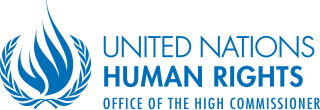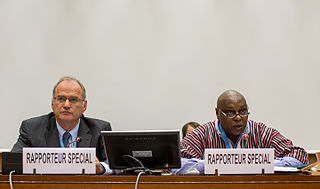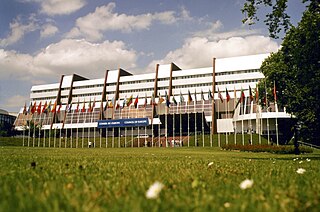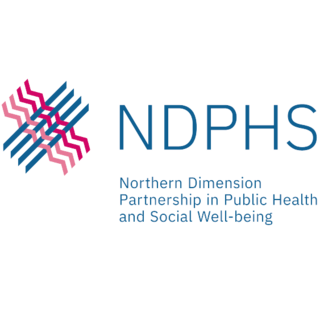
The Office of the United Nations High Commissioner for Human Rights (OHCHR) is a department of the United Nations Secretariat that works to promote and protect human rights that are guaranteed under international law and stipulated in the Universal Declaration of Human Rights of 1948. The office was established by the United Nations General Assembly on 20 December 1993 in the wake of the 1993 World Conference on Human Rights.

The European Ombudsman is an inter-institutional body of the European Union that holds the institutions, bodies and agencies of the EU to account, and promotes good administration. The Ombudsman helps people, businesses and organisations facing problems with the EU administration by investigating complaints, as well as by proactively looking into broader systemic issues. The current Ombudsman is Emily O'Reilly.

The United Nations Human Rights Council (UNHRC) is a United Nations body whose mission is to promote and protect human rights around the world. The Council has 47 members elected for staggered three-year terms on a regional group basis. The headquarters of the Council are at the United Nations Office at Geneva in Switzerland.
A national human rights institution (NHRI) is an independent state-based institution with the responsibility to broadly protect and promote human rights in a given country. The growth of such bodies has been encouraged by the Office of the United Nations High Commissioner for Human Rights (OHCHR), which has provided advisory and support services, and facilitated access for NHRIs to the United Nations (UN) treaty bodies and other committees. There are over one hundred such institutions, about two-thirds assessed by peer review as compliant with the United Nations standards set out in the Paris Principles. Compliance with the Principles is the basis for accreditation at the UN, which, uniquely for NHRIs, is not conducted directly by a UN body but by a sub-committee of the Global Alliance of National Human Rights Institutions (GANHRI) called the Sub-Committee on Accreditation. The secretariat to the review process is provided by the National Institutions and Regional Mechanisms Section of the OHCHR.

Special rapporteur is the title given to independent human rights experts whose expertise is called upon by the United Nations (UN) to report or advise on human rights from a thematic or country-specific perspective.

The Convention on the Elimination of all Forms of Discrimination Against Women (CEDAW) is an international treaty adopted in 1979 by the United Nations General Assembly. Described as an international bill of rights for women, it was instituted on 3 September 1981 and has been ratified by 189 states. Over fifty countries that have ratified the convention have done so subject to certain declarations, reservations, and objections, including 38 countries who rejected the enforcement article 29, which addresses means of settlement for disputes concerning the interpretation or application of the convention. Australia's declaration noted the limitations on central government power resulting from its federal constitutional system. The United States and Palau have signed, but not ratified the treaty. The Holy See, Iran, Somalia, Sudan, and Tonga are not signatories to CEDAW.

The Committee of Ministers of the Council of Europe or Committee of Ministers is the Council of Europe's decision-making body. It comprises the Foreign Affairs Ministers of all the member states, or their permanent diplomatic representatives in Strasbourg. It is both a governmental body, where national approaches to problems facing European society can be discussed on an equal footing, as well as a collective forum, where Europe-wide responses to such challenges are formulated. In collaboration with the Parliamentary Assembly, it is the guardian of the Council's fundamental values; it monitors member states' compliance with their undertakings. The Holy See, Japan, Mexico, and the US are observer states in the Committee of Ministers.

The Congress of Local and Regional Authorities is the pan-European political assembly representing local and regional authorities from the forty-six member states of the Council of Europe. Its role is to promote local and regional democracy, improve local and regional governance and strengthen authorities' self-government, according to the principles laid down in the European Charter of Local Self-Government. It is made up of two chambers, the Chamber of Local Authorities and the Chamber of Regions and holds its plenary sessions twice a year at the Palace of Europe in Strasbourg, where its permanent Secretariat is located.
The Working Group on Arbitrary Detention(WGAD) is a body of independent human rights experts that investigate cases of arbitrary arrest and detention. Arbitrary arrest and detention is the imprisonment or detainment of an individual, by a State, without respect for due process. These actions may be in violation of international human rights law.

The North–South Centre, officially the European Centre for Global Interdependence and Solidarity, is a Partial Agreement of the Council of Europe, the oldest political organisation of European states.
The Universal Periodic Review (UPR) is a mechanism of the United Nations (UN) Human Rights Council (HRC) that emerged from the 2005 UN reform process. Commonly referred to as the UPR, it was established by General Assembly resolution 60/251 of 3 April 2006, the UPR periodically examines the human rights performance of all 193 UN Member States. It is intended to complement, not duplicate, the work of other human rights mechanisms, including the UN human rights treaty bodies. This is the first international human rights mechanism to address all countries and all human rights. The Working Group on the UPR, which is composed of the HRC's 47 Member States and chaired by the HRC President, conducts country reviews.

The INGO Conference is the body representing civil society in the Council of Europe, a European organisation founded in 1949. The Council of Europe has 46 member states with some 800 million citizens and its seat is in Strasbourg, France. The current president is Gerhard Ermischer.
The Panel of the Wise (PoW) is a consultative body of the African Union, composed of five appointed members who each serve three year terms. Its mandate is to provide opinions to the Peace and Security Council on issues relevant to conflict prevention, management, and resolution. Representatives are chosen for the North, East, South, West, and Central regions of the continent.

The Northern Dimension Partnership in Public Health and Social Well-being (NDPHS) is an international networking platform for strengthening professional connections, sharing and co-creating knowledge, and developing joint activities in public health and social well-being. The Partnership is served by the NDPHS Secretariat that was established in 2012 as an international legal entity hosted by the Swedish Government located in Stockholm and funded jointly by the Partner Countries.

The National Human Rights Commission of Mongolia was established under the Law on the National Human Rights Commission of Mongolia (2000) and commenced operations on 1 February 2001. The Law on the National Human Rights Commission of Mongolia was revised in January 2020.

The Institute for Development of Freedom of Information (IDFI) - is a Georgian non-governmental organization which tends to support the development of an informed and empowered society for democratic governance. IDFI promotes human rights and good governance by raising civic awareness through sound informational reports, research and recommendations; Advocates for initiating & implementing reforms of policies, laws and practices to enhance democratic governance.

The Independent Commission for Human Rights is the national human rights institution of Palestine.

Media freedom in the European Union is a fundamental right that applies to all member states of the European Union and its citizens, as defined in the EU Charter of Fundamental Rights as well as the European Convention on Human Rights. Within the EU enlargement process, guaranteeing media freedom is named a "key indicator of a country's readiness to become part of the EU".

The Group of Experts on Action against Trafficking in Human Beings, more commonly known as GRETA, is the monitoring mechanism on human trafficking established by the Council of Europe Convention on Action against Trafficking in Human Beings in Article 36. It stipulates that GRETA can have from 10 to 15 members of independent and impartial experts from a variety of backgrounds. They have been chosen from amongst nationals of the States Parties to the Convention and are known for their competence and professional experience in the areas covered by the Convention; the term of office is four years, renewable once. The current composition of GRETA reflects a gender and geographical balance.

The United Nations Permanent Forum on People of African Descent is an entity of the United Nations whose purpose is to contribute to the political, economic, and social inclusion of Afro-descendant individuals.
















